- Remove the drive pinion, if necessary. Refer to
Drive Pinion and Ring Gear Replacement.
- Remove the inner pinion bearing, if necessary. Refer to
Drive Pinion Bearings Replacement.
- Inspect the axle housing for a pinion position shim between the inner pinion bearing cup or the oil baffle and the axle housing.
- If a shim is present, remove the oil baffle, the pinion position shim, and the inner pinion bearing cup. Refer to
Drive Pinion Bearings Replacement.
- Install the inner pinion bearing cup, if removed. Do not install the oil baffle or the pinion position shim at this time. Refer to
Drive Pinion Bearings Replacement.
- Lubricate the pinion bearings with axle lubricant. Refer to
Fluid and Lubricant Recommendations.
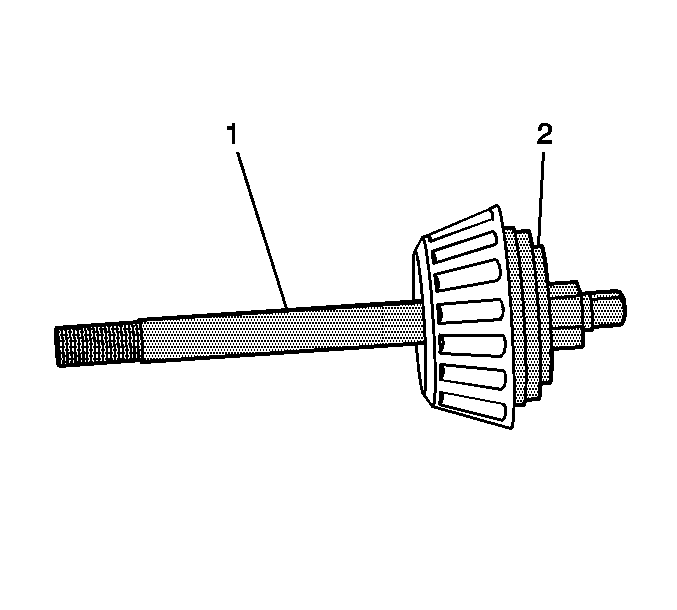
- Assemble the J 45692-5 (2) and the outer pinion bearing onto the J 21777-43 (1) as shown.
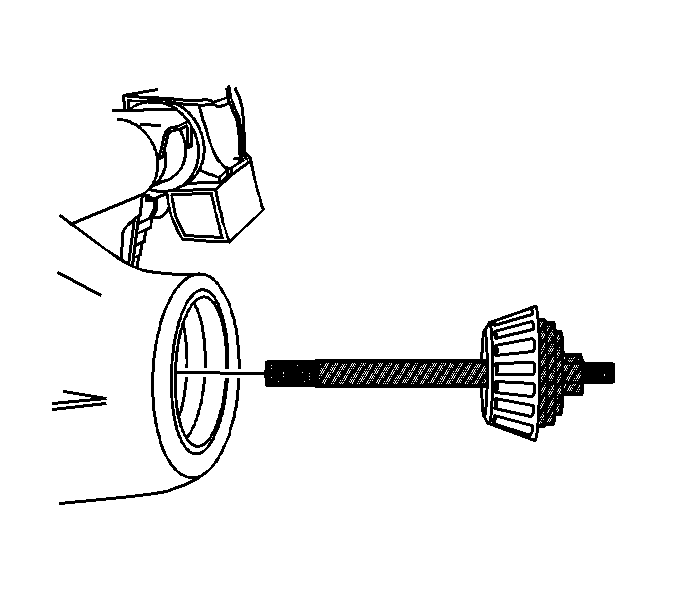
- Install the J 45692-5, the outer pinion bearing, and the J 21777-43 into the axle housing.
- Install the inner pinion bearing into the axle housing.
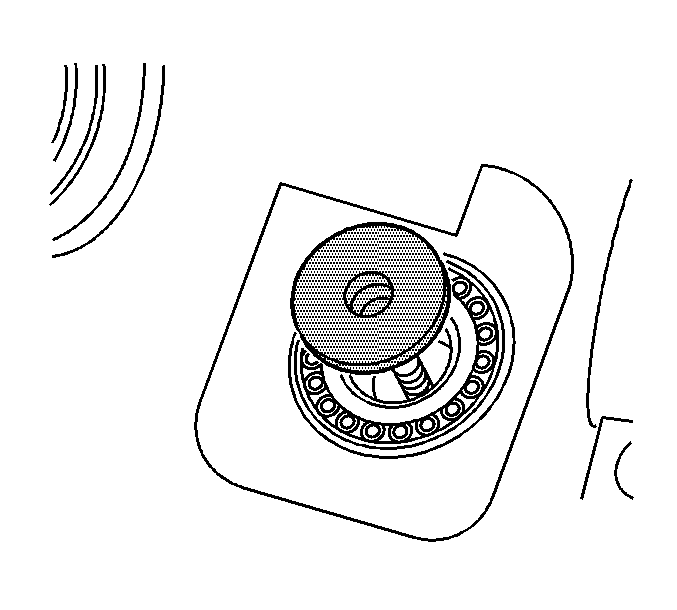
- Install the J 21777-35 into the inner pinion bearing as shown.
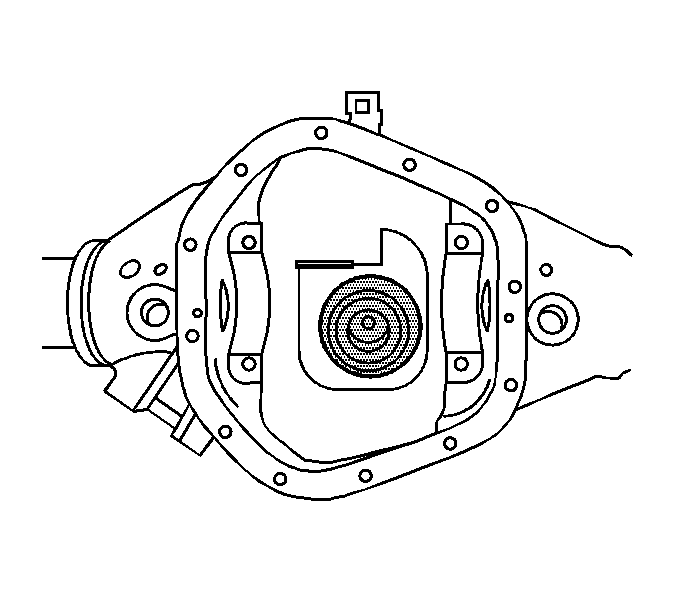
- Install the J 45692-1 into the axle housing as shown.
- While holding the J 21777-43 stationary, tighten the nut on the J 21777-43 just until the end play between the pinion bearings is removed.
- Rotate the assembly several times in both directions in order to seat the pinion bearings.
- Measure the rotating torque of the assembly using an inch-pound torque wrench.
Specification
The rotating torque of the assembly should be between 2.3-5.1 N·m (20-45 lb in).
- If the rotating torque of the assembly is less than 2.3 N·m (20 lb in), continue to tighten the nut of the J 21777-43 until a rotating torque of 2.3-5.1 N·m (20-45 lb in) is
obtained.
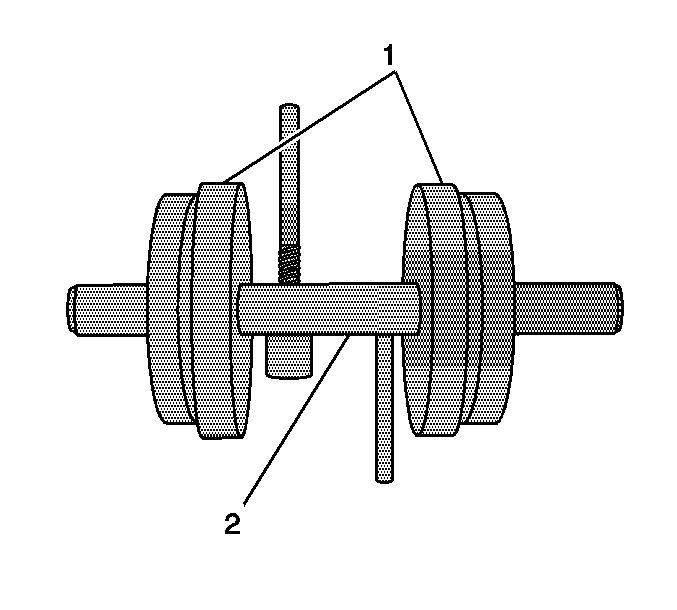
- Assemble the J 45692-2 (1) and the J 21777-1 (2) as shown.
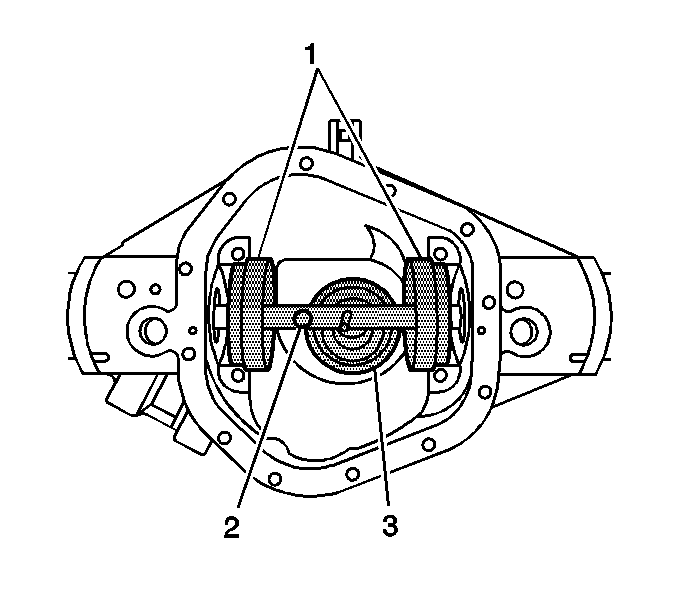
- Install the J 45692-2 (1) and the J 21777-1 (2) into the axle housing. Place the stem of the J 21777-1 onto the bottom step of the J 45692-1.
Caution: Refer to Fastener Caution in the Preface section.
Note: Corresponding letters are stamped on the bearing caps and axle housing. The bearing caps must be reassembled in the same position as removed.
- Install the bearing caps and bearing cap bolts.
Tighten
Tighten the bearing cap bolts to 75 N·m (55 lb ft).
- Rotate the J 21777-1 within the J 45692-2. The J 21777-1 must rotate back and forth freely with the discs. If the J 21777-1 does not rotate freely, disassemble the components, inspect for proper seating and/or mis-aligned
components and re-assemble.
- Install the
J 8001 to the J 21777-1 as follows:
| 20.1. | Loosely clamp the
J 8001 onto the stem on the J 21777-1. |
| 20.2. | Place the contact pad of the
J 8001 onto the mounting post of the J 21777-1. |
| 20.3. | With the contact pad of the
J 8001 touching the mounting post of the J 21777-1, loosen the lock nut on the
J 8001 and push down on the
J 8001
until the needle the
J 8001 has turned 3/4 of a turn clockwise. |
| 20.4. | Tighten the clamp on the
J 8001 finger tight. |
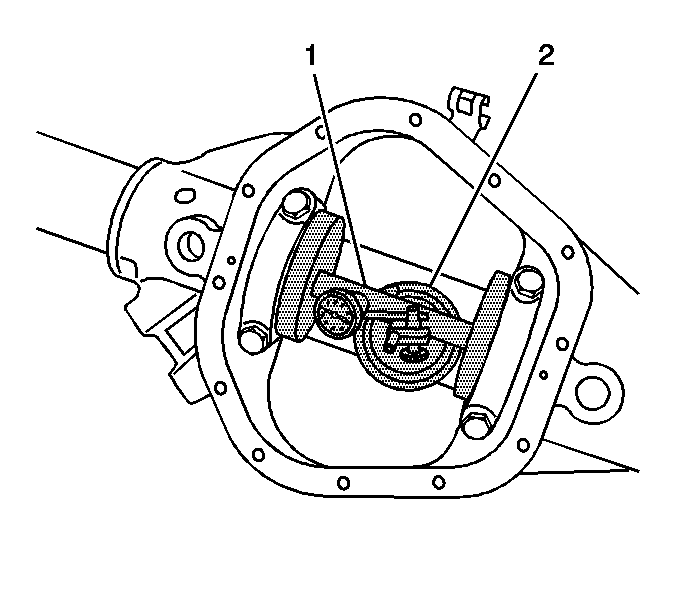
- Move the plunger of the J 21777-1 (1) back and forth on the bottom step of the J 45692-1 (2) until the needle of the
J 8001 indicates the greatest deflection.
The deflection is the point where the needle changes direction.
- At the greatest point of deflection, move the indicator housing of the
J 8001 until the needle indicates ZERO.
- Move the plunger of the J 21777-1 back and forth again to verify the ZERO setting. Adjust the housing of the
J 8001 as necessary to set the needle to ZERO.
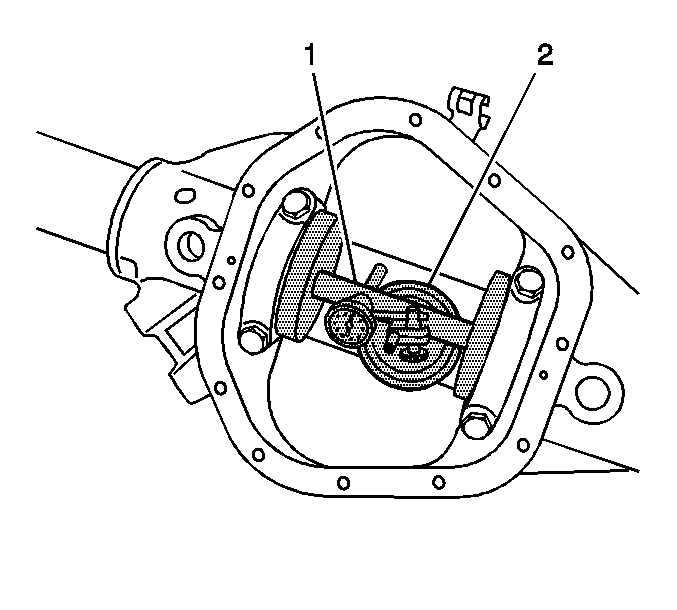
- Rotate the plunger of the J 21777-1 (1) away from the J 45692-1 (2).
The value indicated is the amount of pinion position shim thickness required for a nominal pinion setting.
- If the oil baffle was removed, measure the thickness of the new oil baffle with a micrometer. Subtract this measurement from the thickness determined in step 23.
- In order to adjust the thickness of the service pinion position shim for the drive pinion that is to be installed, do the following:
| 26.1. | Read the number on the button end of the pinion. |
If the number on the button end of the pinion is "0", no adjustment of the pinion preload shim pack is necessary.
| 26.2. | If the number is not "0", the number will also have a corresponding "+" or "-" in front of it. |
The "+" or "-" indicates the amount of pinion position shim thickness
that either needs to be added to or subtracted from the amount determined in step 24 in order to the drive pinion gear to be positioned properly within the axle housing.
| • | For example, if the number on the button end of the pinion is a "+3", this indicates that 0.0762 mm (0.003 in) of shim thickness will need to be subtracted from the value determined in step 24 in order to place the teeth
of the pinion in the best running position with the teeth of the ring gear. Refer to the table. |
| • | If the number on the button end of the pinion is a "-3", this indicates that 0.0762 mm (0.003 in) of shim thickness will need to be added to the value determined in step 24 in order to place the teeth of the
pinion in the best running position with the teeth of the ring gear. Refer to the table. |
- Remove the pinion depth setting tools.
- Remove the pinion bearings.
- Select a service pinion position shim corresponding to the thickness determined in step 25.
Measure the thickness of the shim with a micrometer in order to verify the thickness.
- Remove the inner pinion bearing cup. Refer to
Drive Pinion Bearings Replacement.
- Install the service pinion position shim, the new oil baffle, and the inner pinion bearing cup into the axle housing. Refer to
Drive Pinion Bearings Replacement.
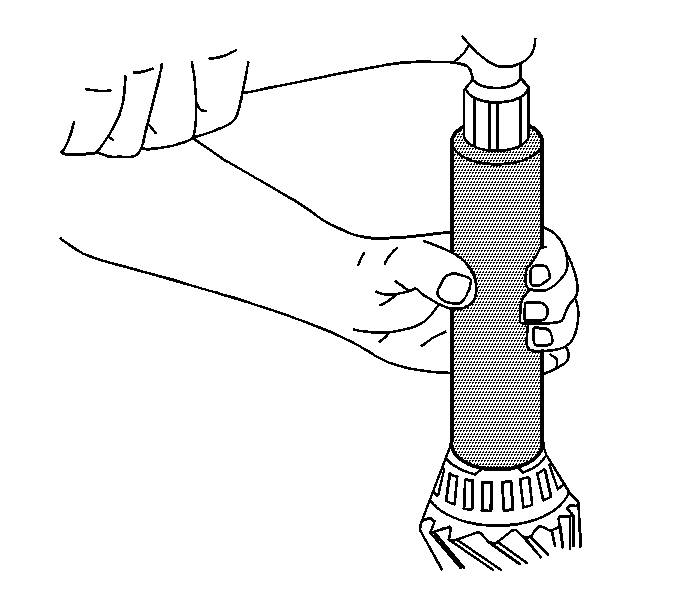
- Install the inner pinion bearing onto the drive pinion using the
J 24433 .
- Install the original pinion preload shims onto the drive pinion. If the original shims are not available, assemble 1.52 mm (0.060 in) of pinion preload shims to install.
Measure each shim separately with a micrometer and
add the thickness together to determine the total shim pack size.
- Install the drive pinion with the inner pinion bearing and the pinion preload shims into the axle housing.
- Install the outer pinion bearing.
- Install the thrust washer.
- Seat the pinion yoke onto the pinion shaft by tapping it with a soft-faced hammer until a few pinion shaft threads show through the yoke.
- Install the pinion yoke nut washer.
- Install the pinion yoke nut.
Tighten
Tighten the pinion yoke nut to 252 N·m (186 lb ft).
- Measure the rotating torque of the drive pinion using an inch-pound torque wrench.
Specification
The rotating torque of the drive pinion should be between 2.3-5.1 N·m (20-45 lb in).
- If the rotating torque of the drive pinion is not within specifications, adjust the pinion preload shim thickness by doing the following:
| 41.1. | Install the
J 8614-01 to the pinion yoke. |
| 41.2. | Remove the pinion nut while holding the
J 8614-01 . |
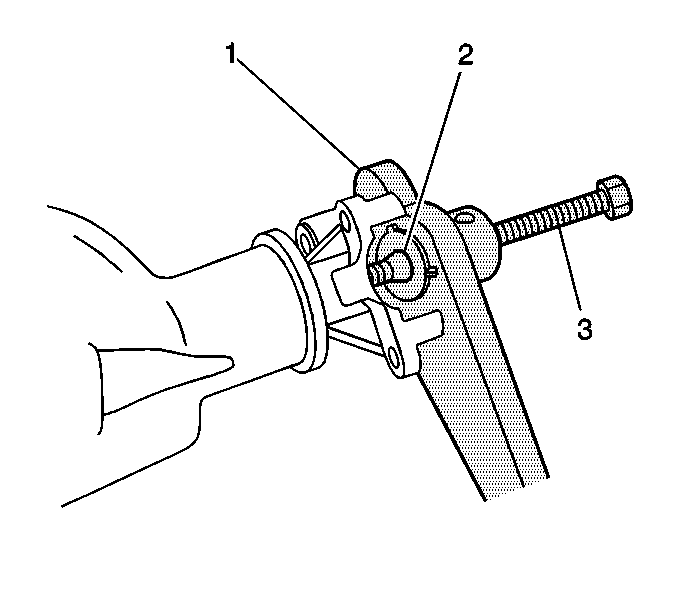
| 41.4. | Install the J 8614-2 (2) and the J 8614-3 (3) into the
J 8614-01 (1) as shown. |
| 41.5. | Remove the pinion yoke by turning the J 8614-3 (3) clockwise while holding the
J 8614-01 (1). |
| 41.6. | Remove the thrust washer. |
Ensure that the
J 22536 is firmly seated on the drive pinion.
| 41.8. | Drive the pinion out using the
J 22536 and a hammer. |
| 41.9. | Remove the outer pinion bearing. |
| 41.10. | Remove the pinion preload shim(s). |
| 41.11. | Adjust the amount of pinion preload shim thickness by doing the following: |
| | Note: Removing approximately 0.0254 mm (0.001 in) of shim thickness will increase the rotating torque by approximately 71-89 N·m (8-10 lb in).
|
| • | If the rotating torque is too low, remove the appropriate amount of shim thickness from the shim thickness pack using the guideline above. |
| • | Measure each shim separately with a micrometer and add the thickness together to determine the total
shim pack size. |
| | Note: Adding approximately 0.0254 mm (0.001 in) of shim thickness will decrease the rotating torque by approximately 71-89 N·m (8-10 lb in).
|
| • | If the rotating torque is too high, add the appropriate amount of shim thickness to the shim thickness pack using the guideline above. |
| • | Measure each shim separately with a micrometer and add the thickness together to determine the total shim
pack size. |
- Install the new pinion preload shim pack onto the drive pinion.
- Install the drive pinion with the inner pinion bearing and the pinion preload shims into the axle housing.
- Install the outer pinion bearing.
- Install the thrust washer.
- Seat the pinion yoke onto the pinion shaft by tapping it with a soft-faced hammer until a few pinion shaft threads show through the yoke.
- Install the pinion yoke nut washer.
- Install the pinion yoke nut.
Tighten
Tighten the pinion yoke nut to 252 N·m (186 lb ft).
- Measure the rotating torque of the drive pinion using an inch-pound torque wrench.
Specification
The rotating torque of the drive pinion should be between 2.3-5.1 N·m (20-45 lb in).
- If the rotating torque of the drive pinion is not within specification, adjust the pinion bearing preload shim pack as necessary following the steps above.
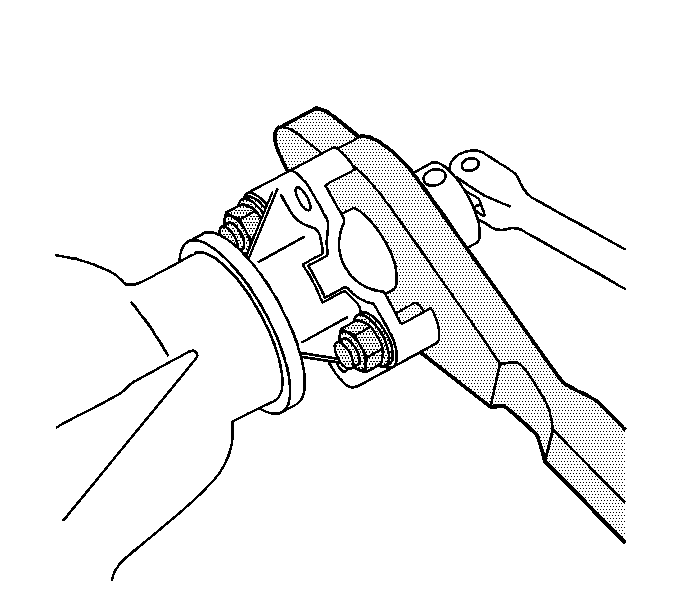
- If the rotating torque is within specifications, install the
J 8614-01 to the pinion yoke.
- Remove the pinion nut while holding the
J 8614-01 .
- Remove the washer.

- Install the J 8614-2 (2) and the J 8614-3 (3) into the
J 8614-01 (1) as shown.
- Remove the pinion yoke by turning the J 8614-3 (3) clockwise while holding the
J 8614-01 (1).
- Apply a light coat of axle lubricant, GM P/N 12378557 or equivalent meeting GM Specification 9986207, to lip of the pinion seal.
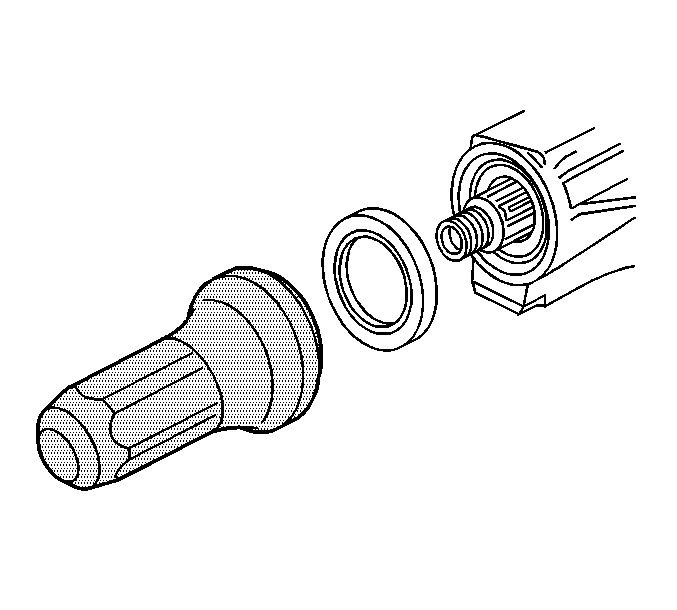
- Install the new pinion oil seal using the
J 45710 .
- Seat the pinion yoke onto the pinion shaft by tapping it with a soft-faced hammer until a few pinion shaft threads show through the yoke.
- Install the pinion yoke nut washer.
- Install the new pinion yoke nut.
Tighten
Tighten the pinion yoke nut to 370 N·m (272 lb ft).
- Measure the rotating torque of the drive pinion using an inch-pound torque wrench.
Specification
The rotating torque of the drive pinion should be between 2.3-5.1 N·m (20-45 lb in).













